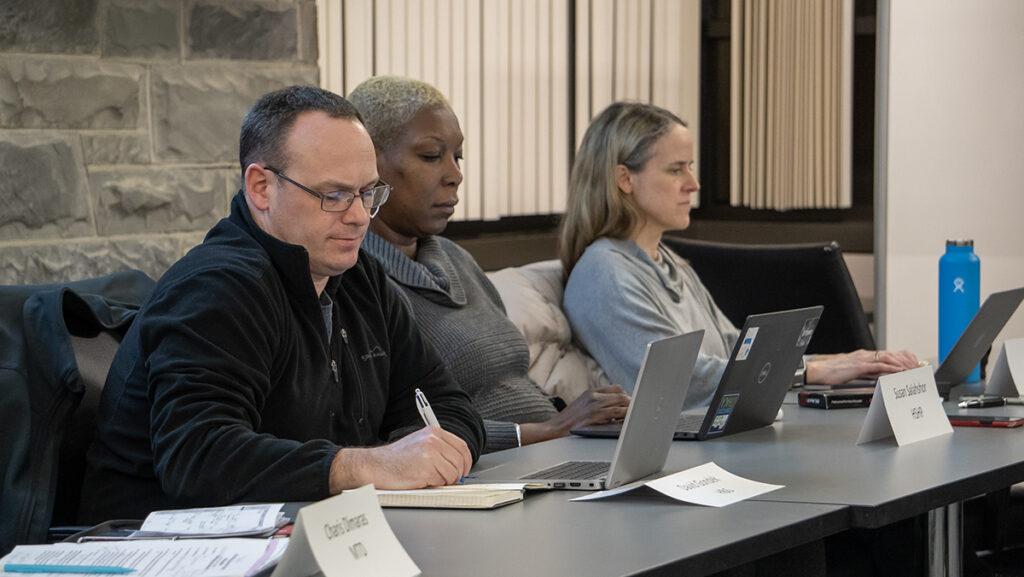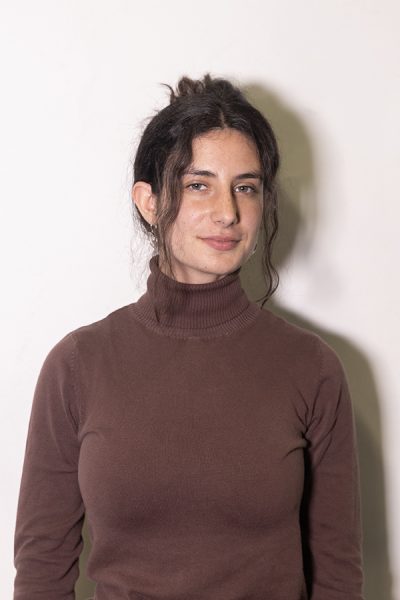Members of the Ithaca College Faculty Council convened March 7 and revisited the Title IX climate review and discussed syllabus policy changes and faculty search committees.
The meeting began with an announcement from Jen Huemmer, associate professor in the Department of Strategic Communication, acknowledging the statements posted by IC Rise Up, highlighting the perspectives and experiences of students of color on campus.
“I just want to make sure that we are all aware of … the student activists who have created IC Rise Up,” Huemmer said. “[There are] discussions happening on campus right now, led by students of color on their experiences in our classrooms.”
Melanie Stein, provost and senior vice president of academic affairs, then gave her report. Stein said faculty have come to her with issues adapting to teaching the current generation of students who have been impacted by the COVID-19 pandemic.
“The pandemic has had an effect on their education, so they are coming into college in a different way,” Stein said. “A lot of faculty [are] voicing, ‘They’re different. They have different needs. We’re struggling to support them.’”
Stein said that as a solution, the Center for Faculty Excellence and the Center for Student Success and Retention are collaborating to provide resources and support for faculty. Stein said a survey is open for faculty to fill out in order to understand what faculty members need.
Brendan Murday, associate provost of faculty affairs in the Office of the Provost and Academic Affairs, spoke to the council about an amendment to syllabus policies. Murday provided a revision to the policy for cross-listed courses, which has not been updated since 2012. The revision clarifies what can be designated as a cross-listed course and adds the word “inter-departmental” to the policy.
Murday also proposed a revision to syllabus requirements to provide information in a course’s syllabus about how many hours students can expect to spend on a course outside of time in class and labs.
“These are certain principles, not contracts, with students,” Murday said. “As a faculty member, when you are going to write the syllabus, you have a lot of discretion to figure out how you write that in a way … [of] making that clear.”
Both the cross-listing policy and syllabus revisions were put to a vote, which passed unanimously in the council.
Murday also discussed diversity advocates on faculty search committees. He said diversity advocates are members of faculty search committees who still perform all the same tasks as other committee members but also evaluate committee members’ bias when identifying and interviewing potential faculty members. Murday said diversity advocates are selected when the faculty search committee members are also being selected.
“The function of [the diversity advocate] … is to keep in mind the ways in which implicit or unconscious bias might creep into the search process,” Murday said.
Murday said diversity advocates have to go through a training session with Belisa Gonzalez, professor and director of the Center for the Study of Culture, Race and Ethnicity, but anybody on the committee can do the training without being the diversity advocate.
“The information that’s covered in the diversity advocate [training] is more specific language … basically about different types of bias and how to mitigate them,” Gonzalez said.
Susan Salahshor, assistant professor and director of the Physician Assistant Program, said the School of Health Science and Human Performance has a diversity advocate on the faculty search committee who is actually a staff member because the team of faculty is so small.
“There might be some hierarchical systems that come into play,” Salahshor said. “How do we protect [diversity advocates] if they do raise a topic? It really sounds like anyone on the search committee should go through this training.”
David Gondek, associate professor in the Department of Biology, presented a proposal to revive the position of faculty ombuds, formerly called faculty advocates, who could help advise faculty when they have questions or concerns.
Lynne Hewitt, professor and chair of the Department of Speech-Language Pathology and Audiology, proposed an amendment to the proposal to clarify the language about training requirements. Hewitt said she thinks faculty ombuds should go through training before assuming the position, not just have access to membership for webinars and training at their own convenience.
“There’s a whole profession of being an ombud; there’s a lot that goes into it,” Hewitt said. “Wouldn’t it be a requirement that anybody [who was] assigned this got formal training?”
Stein said that training and conferences can be expensive, so after discussion, the council agreed that some proof of the faculty ombuds completing the training should be provided to the council. The proposal passed with the friendly amendment attached.
The meeting ended with a discussion of the then-School of Music climate review that was discussed at the Feb. 7 meeting.
Lauren Steele, assistant professor in the Department of Media Arts, Sciences and Studies, raised a procedural issue. Steele said the council does not have a parliamentarian, as the bylaws require, and said one is necessary to continue the conversation about the review. Because nobody responded to a call for a parliamentarian — a member of the council who ensures proper procedures are followed — since the last one stepped down in Fall 2022, Gondek was the temporary facilitator for this meeting’s conversation.
Gondek asked the council how the council can help faculty work on the issues expressed in the summary of the review. Huemmer said that if the review had continued to other schools on campus, similar findings would have been found.
“These are systemic issues,” Huemmer said. “They’re entrenched in academia and in our individual disciplines. … [Issues are] gonna require large-scale, systemic solutions.”
Huemmer read from a letter of support for BIPOC faculty and staff, released by the council in 2020, following the murder of George Floyd. The letter said all members of the campus community need to challenge unconscious biases and complicity in the system of oppression that harms minority students, faculty and staff.
“I would love to be part of the council that found a way to do that,” Huemmer said.
Rachel Schutz, assistant professor in the Department of Music Performance, said that having the conversation about the results of the cultural review is just the beginning of the work that needs to be done.
“We need to become more comfortable with being uncomfortable and learning how to talk to one another,” Schutz said. “A continued discussion around this and improving our discussion is one of the ways we can [help]. Hopefully, this becomes more on our radar when we are in our individual [departments], then we become better at engaging these conversations.”
Steve Gordon, associate professor in the Department of Media Arts, Sciences and Studies, said the council needs help from an expert to learn how to listen to experiences of discrimination.
“It’s helpful to … bring in experts from the outside to help us to see and hear what our colleagues are experiencing,” Gordon said. “If there’s any money we can possibly come up with for that, that would be it.”
Gonzalez said it is important to create spaces where people feel they can have conversations about diversity, equity, inclusion and belonging.
“There’s great value in asking folks from the outside. … It shows a mirror, things we can’t see ourselves, and sometimes that can work from one department to another … and other times it takes someone from outside of the institution,” Gonzalez said.
Gonzalez said she can share readings and conduct a 15-minute training session at the beginning of the next Faculty Council meeting to help members of the council understand the language around their conversations about discrimination on campus.
“Clarification helps so many conversations,” Gonzalez said. “If you have ideas about how to support and have these conversations, or specific issues raised by our students, please let me know.”









